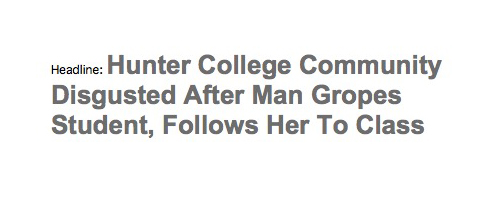
By Carmen Rios-Nuñez
Class discussions, writing assignments tantamount to unannounced quizzes, several out-of-class interviewing exercises, critiquing other student journalists’ works and a special project following up a flawed local CBS story about a Hunter student groped on a subway train helped me to become a better reporter.
“I had no idea that had occurred,” said Khristina Williams, 24, a media studies and theater major, wearing a gray sweater, black jeans, and carrying a “black lives matter” tote bag around her shoulder. This was my fellow classmate’s response when I questioned her about the latest news on campus at the time in the early weeks of the fall semester: A man who groped a 19-year-old student inside the 68th Street train station followed her onto the campus and eluded security because a security guard was distracted, according to the NYPD and Hunter College.
I was surprised to learn that many students were not aware of the incident. This assignment was my favorite because it was based on writing a better story than the one that was published by the local CBS affiliate. I liked the idea that I could learn from the mistakes of a professional news organization and produce the best possible update of the story for the Hunter campus. We reviewed the CBS news report [see here] and critiqued it. The article lacked sufficient sourcing and information. The headline and the lead for the story, our editor-instructor said, were dead giveaways that the reporting would be “hogwash.”

Lead (first paragraph): The Hunter College community felt shock and disgust,[sic] after a student was groped on the subway and then followed to class.”
Hunter has more than 16,000 undergraduate students, the editor/instructor said, and several campuses. How many students were interviewed for this article? he asked. One. How many college spokespeople? Apparently none.
Each student reporter was given a specific campus department and, or a specific campus official to interview and we used the combination of notes to write our own news stories. I thought it was a great collaborative exercise that allowed for individual perspectives. It was also the first time I interviewed any department official at Hunter: Public Safety. Because the semester fell during the presidential election, I also wrote several election pieces.
“I am extremely concerned about Donald Trump because he is a loose cannon who doesn’t have the temperament to be president,” said Thomas Ranocchia, 25, a media studies major, who was wearing a Coca-Cola T-shirt, jeans, a hoodie, and sneakers, during the interview that took place in a classroom. “At the same time, Hillary Clinton turns me off due to her dishonest nature, the scandals surrounding her, and my belief that her first term as president would be akin to a third term of Barack Obama, who I have considered to be a weak leader.”
My interviews made me realize that like Ranocchia many students were considering voting for a third-party or write-in candidate. It also helped keep me stay updated on the latest election news.
My second election article was about students’ thoughts on the results. I enjoyed writing it because I had never covered an election topic before. I thought it would be interesting to hear what my peers had to say then.
“I think I was happy to see that people could actually make a difference in the election, so it kind of gave me hope for democracy,” said David Pantoja, 34, a journalism and sociology major from Queens, Astoria, who registered Democrat to vote for Bernie Sanders, but who would have normally registered as independent or green. “It’s putting a negative face on the government instead of giving us this image of everything’s okay. I feel like it’s going to bring more opportunities for people to be angry and realize what the government has been doing all along, which is using violence to protect the interest of a few, and I think that’s a positive even though it’s a negative.” This was one of my favorite quotes because it gave me a whole new perspective.
I learned that Pantoja is a Mexican American whose mother was an illegal immigrant. Still, he said that although he was not happy with Trump’s policies, there was a part of him that was happy Trump won. Pantoja’s open-mindedness opened up my mind and I think that is one of the best parts of being a journalist – learning from others and using that information to become more open minded, objective, and knowledgeable; using all these skills to tell people the truth.
I enjoyed looking over the professor’s edits on my articles. They made me realize that I have to work on making some of my sentences shorter. My main goal was to improve my writing and learn from others, and I think I did that. I am also thankful for all the interviewing practice I got this semester. It forced me to be more involved in the school. And that is exactly what I needed.
Carmen Rios-Nuñez can be reached at Carmen.Rios66@myhunter.cuny.edu